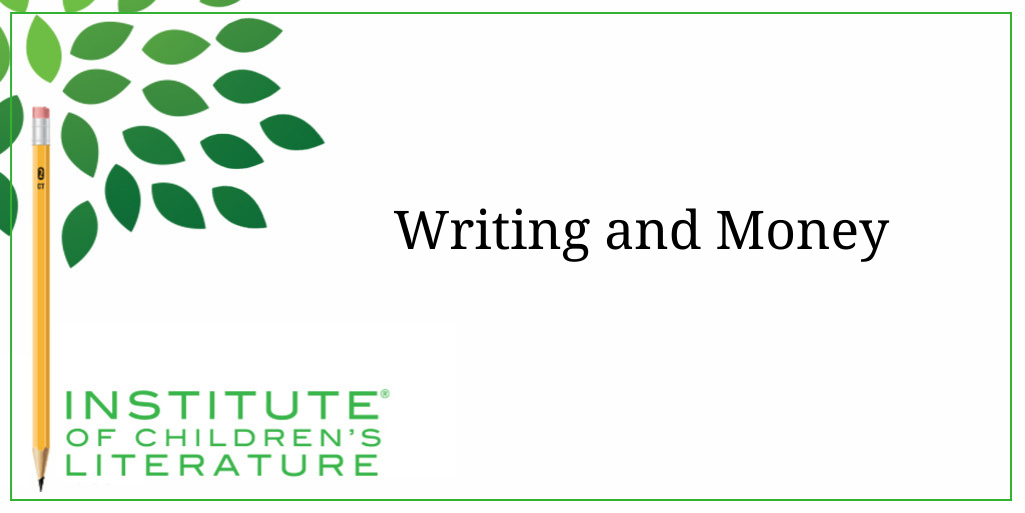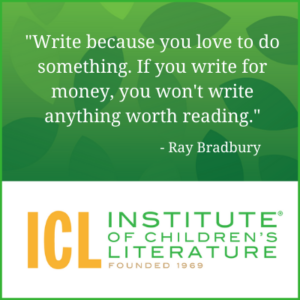
5 Ways Writers Can Prep for 2025 Goal Setting
Before we roll on to the new writing year, let’s harness our optimism for the blank slate before us and prepare for our 2025 Goal Setting just for writers.

We teach our students how to write and get published!
View our Course Catalog >
As with many arts-based activities, writing can be many things, and all are valuable. Writing can be therapeutic, a way to work through personal experience and personal pain. Writing can be a joyful pastime, an opportunity to play with words and ideas. Writing can be a way of sharing personal experience, knowledge, and thoughts with others. Writing can also be a career, and that’s when money comes into play. Professional writers take on extra challenges, and often face extra limitations as well. So the decision to write for money is best made after careful consideration of what you’ll gain and what you may give up. As with most things in this life, the decision to write for money instead of strictly for your own pleasure involves both gains and losses.
Writers who write professionally, which means writers who write for money, obviously gain potential income. Most writers who have the skills to begin making money and who continue to grow, improve, and build skills, will see a slow but steady increase in money made from writing as well, especially if they educate themselves about the publishing business. There are always outside limits on this. Certainly the pandemic taught a great many writers that this is a business that can experience quick changes when something catastrophic happens. During the pandemic, more books sold and more people were reading, but there were also challenges with editors working from home, as well as issues with printing, shipping, and selling. All of this resulted in fewer contracts and slower publication times for those who did sign with publishers. In some specific areas of publishing, such as educational books, the reduction in work was severe. For many full-time writers (myself included), this resulted in a serious hit to revenue. Writers are basically self-employed, which can sound like having total control, but tends to act more like having few guarantees.

Still, despite the difficulties inherent in reaching desired buyers for self-published books, these writers do gain more control over every stage of the book’s creation and a larger percentage of the income made from the book. Publishing with commercial publishers means the publisher takes the lion’s share of the money’s made, but also does the lion’s share of work in areas like book design, illustration, promotion, push to book stores, and the like. Despite making a bigger percentage of the income, self-published writers do not automatically make more money. For many, very little money is actually made on the project and for some, publishing is done at a loss. Self-publishing is best approached after careful research and conversations with successful self-published writers. Beware of self-publishing companies, who often do not have the writer’s best interests at heart. And enter into any agreement as a self-publisher only after careful, clear-eyed research and evaluation.
For writers who create manuscripts and then seek out agents and publishers, the actual writing of a book is bound only by the constraints an author chooses to take on. That doesn’t mean the writer won’t receive input from potential agents or publishers that want changes before considering a book for publication. Often changes are made to improve the book. Such changes may include strengthening characterization, changing sub-plots that aren’t working or creating a stronger emotional arc. But not all requested changes are about quality. Both agents and publishers are vitally interested in sales as they affect the income the book will generate. Because of this, suggestions sometimes involve things that are believed to make the book more marketable or more appealing to readers. Young adult authors, for instance, are often asked to strengthen romantic elements or simply to add them when they do not exist. With some publishers, there may be resistance to elements that affect the potential sales to schools or libraries (such as asking for a reduction in the amount of sex portrayed or the use of some language). There may also be suggestions made to reduce the chance of presenting objectionable depictions of female characters or characters in different groups. Ultimately, no publisher or agent can force a writer to do anything, but the alternative may be that the publisher or agent walks away from the project. This can make a writer feel as if the choice isn’t really a choice. Despite this, most writers don’t mind the give and take that occurs as they work with agents and editors. Though it can sting at first, many see that most suggestions result in stronger books and better sales. Agents and editors share a desire with writers: the production of stronger, quality books that will reach a wide audience.
Whenever writers enter into publishing agreements, contracts show up. Contracts lay out the requirements on the part of the publisher and on the part of the writer that are agreed to in order for the publication process to proceed. Any money the writer hopes to make from the deal will happen because of details in the contract. That makes contracts vitally important. No writer should sign any contract without understanding it. It’s an excellent idea to read as much as possible about contracts and the things that can appear in them BEFORE ever being put in the position of signing one. A wealth of material exists online about publishing contracts. Some writer organizations, such as the Society of Children’s Book Writers and Illustrators (SCBWI) and the Author’s Guild also share information with writers to help put them in a better position to understand contracts. The wording of contracts can be complex, and when you’re experiencing the thrill of publication, it’s easy to decide you don’t really need to understand everything. In fact, you do. You may even consider having a lawyer with knowledge of the publishing industry take a look at your contract to help you understand the nuances. Don’t be afraid to ask for changes in a contract if you’re uncomfortable with certain clauses. So take the time now to research what to expect from contracts and what the basic terms you may encounter mean. It will help you save money in the long run.
The decision to write for money does add complexity to a writer’s life. You need to keep good records. You need to understand contracts. You need to ask questions and research. Not all publishing works the same, so research needs to be directed at the segment of publishing you are entering. All of this is work, but the benefits go beyond money. Often publishing for money also means reaching more readers and making more connections. So, this isn’t something to dive into without thought, but it’s also not something you need to fear. Take your time, be wise, and be kind to yourself if you make mistakes. You may not ever be a bestselling author, but that doesn’t mean you won’t be a success both in terms of your art, your money, and the love your book receives from readers.
With over 100 books in publication, Jan Fields writes both chapter books for children and mystery novels for adults. She’s also known for a variety of experiences teaching writing, from one session SCBWI events to lengthier Highlights Foundation workshops to these blog posts for the Institute of Children’s Literature. As a former ICL instructor, Jan enjoys equipping writers for success in whatever way she can.

Before we roll on to the new writing year, let’s harness our optimism for the blank slate before us and prepare for our 2025 Goal Setting just for writers.

Writers can be thin-skinned when it comes to getting feedback on their work. Let’s look at 4 ways to positively deal with constructive criticism!

Rejection is part of the territory when it comes to being a writer. Today we offer reflection for writers to help redirect your efforts after a rejection.
1000 N. West Street #1200, Wilmington, DE 19801
© 2024 Direct Learning Systems, Inc. All rights reserved.
1000 N. West Street #1200, Wilmington, DE 19801
© 2024 Direct Learning Systems, Inc. All rights reserved.
1000 N. West Street #1200, Wilmington, DE 19801
© 2024 Direct Learning Systems, Inc. All rights reserved.
1000 N. West Street #1200, Wilmington, DE 19801
© 2024 Direct Learning Systems, Inc. All rights reserved.

1000 N. West Street #1200, Wilmington, DE 19801
© 2025 Direct Learning Systems, Inc. All rights reserved.

1000 N. West Street #1200, Wilmington, DE 19801
©2025 Direct Learning Systems, Inc. All rights reserved. Privacy Policy.
2 Comments
I am interested in work for hire. I am a retired teacher with experience in elementary, middle, and high school in Language Arts, Reading, and ESOL. I am a writer of children’s books and enjoy writing Picture Book, Young Readers, Middle Grade, and Young Adult. I worked at B&N as a Lead in Children’s Dept. and was known as Miss Glori in Story Time.
Hi Glorianne. Sounds like you’d do really well in educational writing for hire. Search for Evelyn Christensen’s website and you’ll find a long list of educational publishers, most with links to how to contact. Start making connections and I’m sure work for hire will happen.